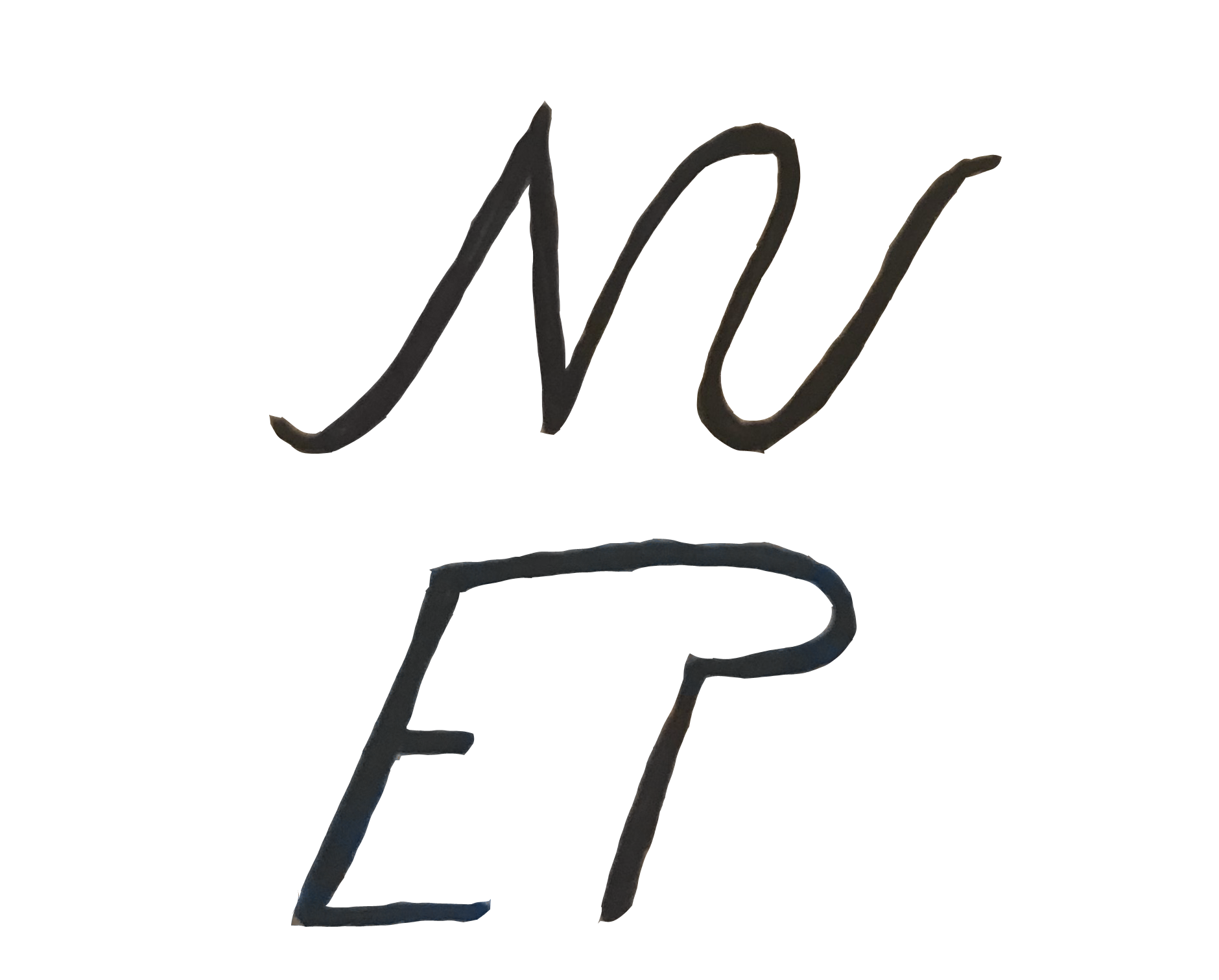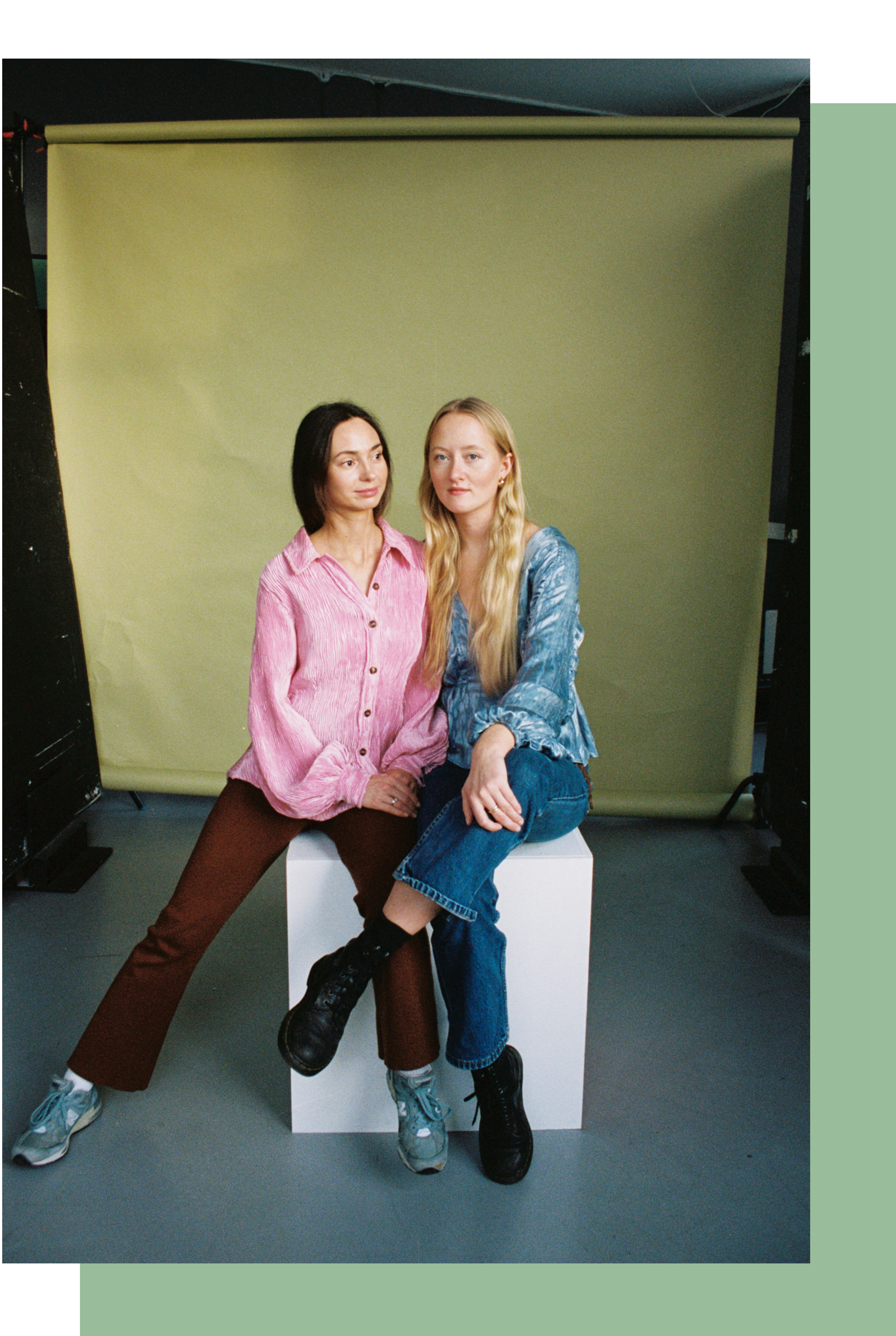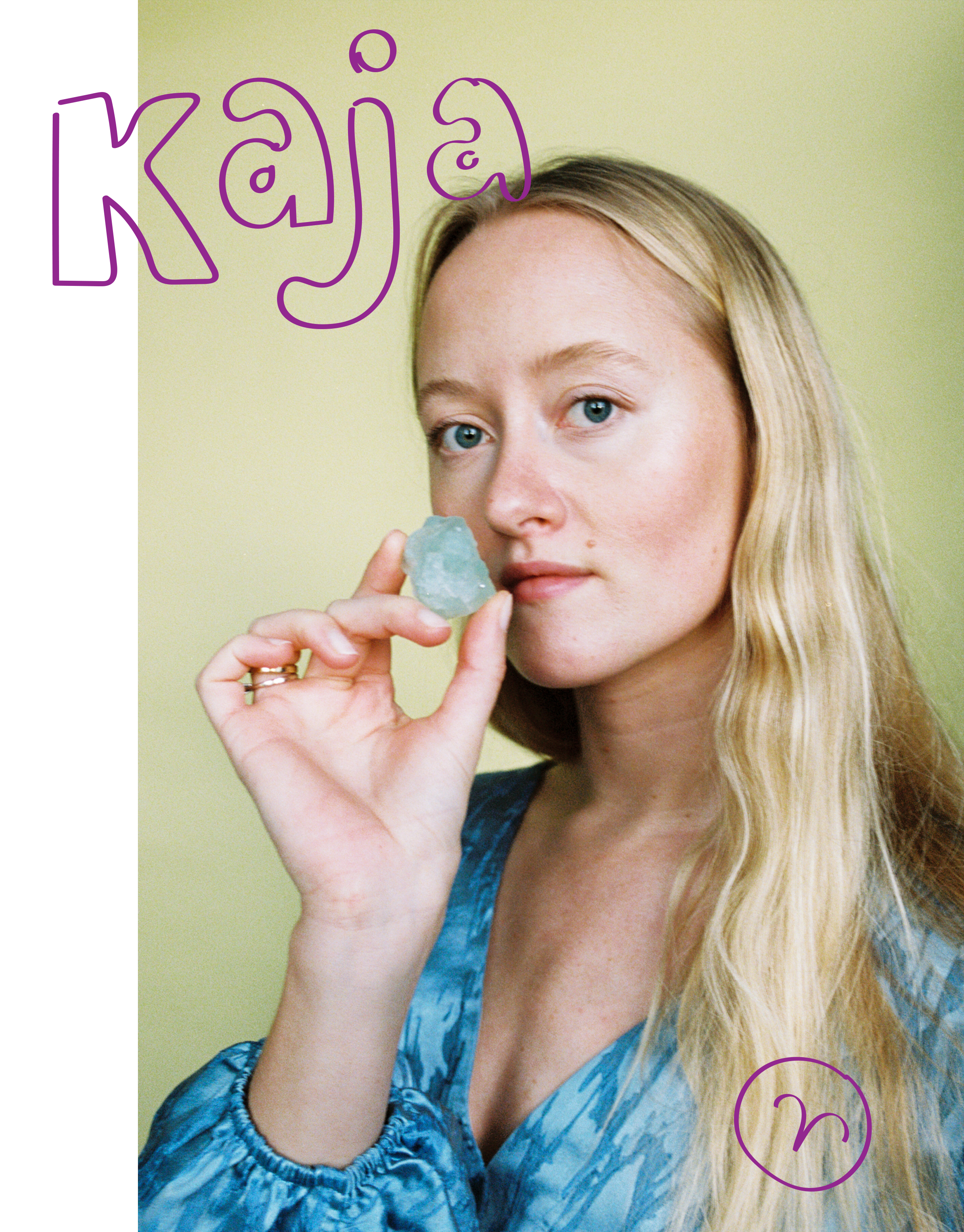Spirituality in 2020, A Trend or here to stay? : Interview with ‘Alternatid’
Astrology, Shamanism and chakras; maybe they are vital parts of your daily routine, or maybe they are too alternative practices for your taste- or perhaps you are simply sick and tired of it taking over your Instagram feed? Regardless, chances are that you have some questions and curiosity tied to the subject.
This is where 27-year-old art-director Vilde Haagenrud and copywriter Kaja Møller-Hansen comes in. With their podcast Alternatid dropping this spring, they are tackling and touching on everything spiritual; from astrology to mindfulness and psychology. As Vilde puts it: “In Alternatid, we are curious and sceptical enough to make room for the full spectrum. We have no intention of convincing anyone of anything, we simply want to make spirituality more available to the listener, and open up for an interesting discussion.”
Before the first episode launches, we wanted to know more about their plans for the podcast, their personal relationship with spirituality, and the role they think it plays in the 21st century.
Quick-fire
Photo from behind the scenes of Alternatid’s cover shoot by Julianne Leikanger. From the left to right: Vilde and Kaja.
What does spirituality mean to you?
K: Connection.
V: The belief that there might exist more than what we can explain by logic, and I do that by exploring the space between what I can see and what I can feel.
If you only have 10 minutes to spend on self-care, what is on the top of your list?
K: A breathing exercise.
V: To allow myself to sit, lay or walk in silence without listening to something or watching/reading something. When exposed to the huge amount of impressions throughout the day, it feels very calming with a silent break. That’s the only way I get time to process and re-evaluate my thoughts, or let things go, which is necessary for me to open up for new impulses.
Describe your ideal way to start the day?
K: My ideal way to start the day is waking up early enough to do yoga, before shower and breakfast. But I have a tendency to prioritise snoozing.
V: Early enough to have time to do everything without rushing.
The last book you read?
K: Siddhartha by Hermann Hesse.
V: Invisible by Paul Auster.
Describe the other person only using three words.
K: Joyful, committed, charismatic.
V: Empathic, reflective and warm.
Personal
You may be asking yourself how this copywriter and art-director ended up exactly where they are now, with a spiritual podcast launching in a few weeks. Well, it was actually the podcast that first brought them together, alongside a stoke of luck. It all started when Kaja wanted to make something creative out of her interest in spirituality. When the idea of a podcast came to mind, she remembered Vilde, who had been documenting her spiritual side on Instagram. After sharing the idea with her sister in the park one day after work, the two of them stumbled upon Vilde in a shop. “We had a long and exciting rant about the project on our way home. It felt like a meaningful coincidence!” Kaja explained.
While there was no doubt that they both had a shared passion for spirituality and a desire to do something creative with it, their spiritual journey was two paths that started off very differently, before they crossed. For Kaja, it was the ‘The Power of Now’ by Eckhart Tolle back in 2016 that originally sparked her interest.
“I remember getting a weird sensation in my body when the message in the book “clicked” - understanding that we are more than our mind and what our mind tell us. From there on I’ve had similar experiences through Kundalini yoga and other moments in my life,” she said.
Vilde was first introduced to the spiritual world through her ex-boyfriend and the meditation organisation Ananda Marga.
“I was extremely fascinated by it, both the spirituality and their lifestyle routines, which could be a bit strict sometimes. It felt like a big relief to discover that I had all these easily accessible tools for affecting my own happiness. After living in a superficial environment where I normally would look outwards to seek joy, it felt relieving to concentrate on my inner-self.”
After the break-up she decided to take some time to explore her personal relationship with spirituality, trying to dig deeper than before, and as a result, she ended up taking a Hatha Yoga teacher training programme.
“That helped me understand that there’s no right or wrong way to explore spirituality. It’s okay to be both skeptical and curious. I am not as naive as I was when I was first introduced to it, and even though my feelings towards it might change, the spirituality itself is everlasting.”
Mum: “Maybe we are under the influence of the full moon?” Photo: @Kajapiraja
Exploring different aspects of spirituality seems to be an important part of the practice. Vilde points out that the understanding of the ‘ego’ is something that she finds particularly interesting, which is also one of the topics you can expect to hear about in the podcast. Kaja emphasises the way spirituality help you let go of control and accept your own emotions.
“For me spirituality is much about sustainability, both in a personal picture and a bigger picture. How we treat ourselves reflects how we treat the world. I think spirituality teaches love.”
Spirituality is a broad term used about various forms of practice, meaning that it is easy to get lost when someone identifies as a “spiritual person”. Some claim to heal illness with the mind, others cleanse the soul using plants and some start each morning with a Tarot reading. It is important to remember that spirituality is a very personal journey, and it can look very different from person to person.
“I think I’m naturally distancing myself from any spiritual or alternative direction that think they have all the answers,” Kaja said.
“All industries have shady people with bad intentions, including the ‘alternative’ business. At the same time, there are many genuine people offering positive, alternative experiences. I think you should go see a licensed doctor when feeling ill, but it should also be ok to combine traditional medicine with a spiritual practice if you feel like it. We hope that discussing spirituality openly, makes it a bit easier to make healthy decisions when it comes to this,” Vilde explained.
As a result of an abundance of different lables, like religion, agnosticism and spirituality, it can be hard to wrap one’s head around the difference between them all. - Where do you draw the line? Can you be both spiritual and religious? Can you not have one without the other? What is clear is that each expereicne is different, and Kaja and Vilde are living proof of this. While Vilde does not consider herself religious, Kaja settles on “agnostic” for now.
“I don’t know who or what I believe in, I just know that I believe in something. I think religion is a concrete outcome of spirituality, in a way. And that spirituality in itself is the term describing the inherent dimension in all humans, capable of wonder and seeking,” said Kaja.
Vilde points out that she does see a difference between the role of religion and spirituality in people’s personal lives. For instance, she does not believe in collective, organised beliefs, or worshipping people or Gods.
“Even though spirituality gives me a collective connection, it’s an individual practice for me. My understanding is that religion is a more systematised belief within spirituality, while spirituality is a general belief that there exists more than what we can see and explain through logic. I believe that every religious and spiritual experience is unique, and that people may seek to it for different reasons. That being said, I think both can affect people’s lives in both positive and negative ways, depending on how you interpret and practice it. I don’t think anything is healthy when taken to the extreme.”
“Alternatid”
The podcast is meant for anyone who are curious about spirituality, but why listen to ‘Alternatid’ in particular?
“I think our uniqueness comes from the fact that we explore different alternative/spiritual themes in a curious way, without being biased on either side. We find value in speaking with people who have dedicated their life to these things, and hope our listeners do too - no matter what they believe in!” said Kaja.
“In today's society it’s normal to live under a huge amount of pressure while chasing success, mainly looking for the solution outwards. Now we see how this lifestyle affects us on an individual level, but also on a collective level, pushing both ourselves and the globe to the limit. Spirituality offers space to look inward for the solution, a simple and more sustainable counterbalance to the stressful lifestyle.
Media presents health and spirituality issues as a discussion about traditional medicine vs. spirituality, while we believe that there is room for both. We think a more open and curious approach to the subjects can contribute to a healthier discussion where both parts can learn from each other,” said Vilde.
The year is 2020 and the spirituality-trend is still very much alive on social media. But as a result, self-care and spiritual products have become a subject to capitalist-gain. One question that follows is whether or not that is an issue?
“I think we live in a society full of paradoxes, and I really don’t see the problem with someone making money on a healing session vs. someone making money on clothes. Fast fashion is kind of a bad and short-lived healing session anyway. As with all things, you should not be naive, or look for any quick fix. I root for a more integrated and holistic view on health,” said Kaja.
“I think spirituality can offer many much-needed healthy and easily accessible tools that may improve our present wellbeing.
I also think it is fair to make money on alternative products, if done with the right intentions. It is a great misunderstanding that spiritual services should be for free. A professionalised business is often more transparent, and I think everyone benefits from that. I think it is more problematic when unprofessional people claim they offer alternative treatments, which is hard to regulate. And I hope our podcast will make it easier for our listeners to identify the level of seriousness,” said Vilde.
While some people see spirituality as merely a trend and questions its populrity in a few years time, Kaja has another impression:
“Spirituality offers sustainable tools (for example meditation), and I believe, even though it is a trend right now – it’s here to stay.”
There are many tools available; like crystals, tarot cards and sage, but it is often put into question if they actually have an effect on people, or if people are responsible for the impact themselves because they believe in it. Vilde explains that she does not know if the Placebo effect plays a role in spiritual practices, but that a positive outcome of the Placebo effect, is still a positive effect.
“I think the Placebo effect is fascinating and kind of spiritual in itself, because it shows how we’re able to change something just using our thoughts. That being said, I have never experienced any Placebo effect in relation to spirituality. A spiritual practice is hard work,” said Kaja.
Another typical form of sceptism towards the spiritual is the belief that it causes a less engaged public. Some would argue that it supports the mindset where people accept the world as it is because they believe in destiny and the saying “everything happens for a reason”. Once again, Kaja disagrees.
“People are more aware of themselves and the world we live in, and knowing that you have to act on it to make a change or to make something happen for yourself.”
Vilde believes that some spiritual concepts can make it easy to blame external factors for what is happening, instead of taking personal responsibility, but concludes with this:
“I believe that everyone has responsibility on an individual level, and I think an open discussion about spiritual mindsets is the right way of approaching these types of misconceptions.”
In an industry with so many different ideas and understanding, Vilde and Kaja are offering a space for open discussion about spirituality. They are comfortable about not being understood by everyone, but hope the right audience likes their take on the subject. For now it is just a hobby, but they will continue to go with the flow and see where that takes them.
Related content
You might know Cecilia from the postcard inside your pink glossier bag, or from her successful ig account @ceciliagorgon where she captures her life in squares. You’ll see her sporting dewy looks and sustainable fashion, exploring Japan and cuddling with her dog Sigi.
Words by: Liv Harwood Tarot cards are playing cards, they’re not scary and definitely not going to mean exactly how they initially seem, like the death card, this card rarely means death funnily enough. It’s a sign of rebirth.
Sløtface is a Norwegian punk-rock band from Stavanger that started their music career as a band in 2012. Since then they've been touring USA, Australia and Europe. In fact, the day after we did this interview they won their first Norwegian Grammy Award.
“I think it’s unfortunate, so I just keep living my life where I buy all the old funny things and give them a loving home again.”











